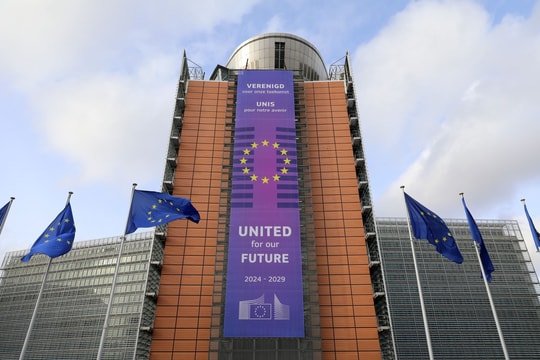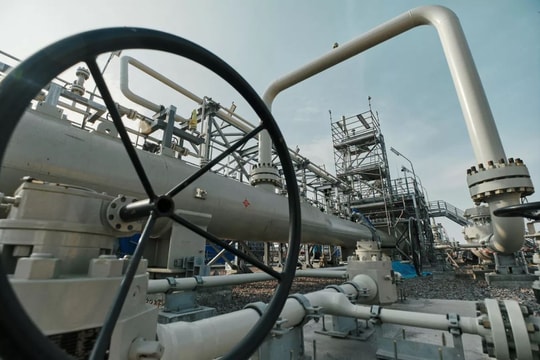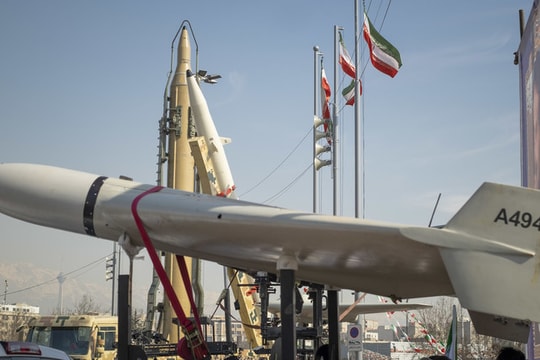Russia actively pivots to Asia: A win-win situation!
(Baonghean) - For the first time since becoming an official member of the East Asia Summit (EAS) within the framework of the ASEAN Summit and related conferences, this year, Russia attracted attention with the presence of Russian President Vladimir Putin.
The fact that Mr. Putin personally attended this event instead of Prime Minister Medvedev as usual has attracted special public attention. But if we look at the overall series of recent moves of the Moscow government, especially at the ongoing "Asia-Pacific Week", it will not be difficult for the public to recognize President Putin's efforts to promote "pivot" to this geostrategic region.
Russia's mark at "Asia Week"
With a series of top important events of the year being the ASEAN Summit, related conferences in Singapore and the APEC Summit Week in Papua New Guinea, public opinion has called this “Asia-Pacific Summit Week”. In this series of activities, people are also witnessing very positive moves from the Russian delegation.
Russia has registered to participate in all important forums such as the Russia-ASEAN Summit, and held many bilateral talks with Asian leaders such as Indonesian President Joko Widodo, Singaporean Prime Minister Lee Hsien Loong, South Korean President Moon Jae-in, Japanese Prime Minister Shinzo Abe, Prime Minister Li Keqiang and Thai Prime Minister Prayut Chan-o-cha. In particular, Russian President Putin personally came to Singapore for the first time to attend the East Asia Summit (EAS).
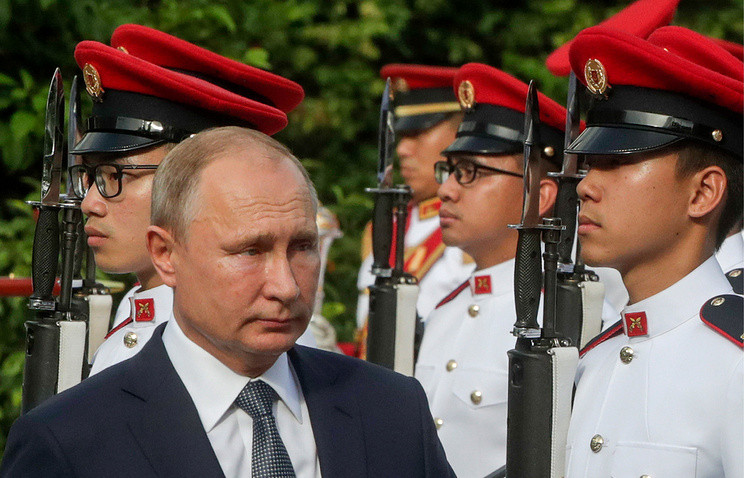 |
| Russian President Vladimir Putin reviews the guard of honor during his visit to Singapore. Photo: TASS |
It should be recalled that EAS is an annual conference between ASEAN member countries and 8 dialogue partners including: Australia, Japan, India, China, New Zealand, South Korea, Russia and the United States. And it is even more remarkable that this EAS Summit is absent from US President Donald Trump and Chinese President Xi Jinping. This also means that Russian President Putin has "accidentally" become the top concern at this important conference. Not missing the opportunity, Russia is expected to promote initiatives on dialogue at all levels on a regional security structure, of course, in which Russia will have a significant contribution.
In fact, it is not until now that the Russian President Putin's administration has shown interest in the Asian region. Remember, in 2010, Russia launched the "Look East" policy. But since then, Russia has not really invested properly and made specific moves to realize this policy. Therefore, this is considered a necessary time for Russia to readjust its strategy in the region.
According to observers, this is also a way for Russia to make up for the gaps in its relations with countries in the Asia-Pacific region. Before that, Russia always only valued relations with European countries - Moscow's traditional partners. But everything changed when the relationship between Russia and Europe fell into crisis after the annexation of Crimea to Russia in 2014. Since then, Russia has become the target of strong sanctions imposed by the US and Europe. Russia's economy has since fallen into a spiral of crisis with slow growth, devaluation of currency, and interrupted or severed economic cooperation relationships...
Warming up the "Look East Policy"
Inevitably, the search for new potential cooperation partners has become the focus of Russia's foreign policy since relations with the West became tense. From Africa, the Middle East and now the Asia-Pacific region, especially Southeast Asia - ASEAN countries with dynamically developing economies. This will be a potential market for Russia to re-establish import-export supply channels, reduce dependence on oil exports to Europe, open up cooperation opportunities with new partners as well as reduce pressure from Western sanctions on the Russian economy.
Russia’s pivot to Asia strategy has been reflected in a wide range of areas, from economics to politics, security and defense. In terms of economics, since 2015, Russia has established a new economic forum called the “Eastern Economic Forum” (EEF) – similar to the St. Petersburg International Economic Forum (SPIEF) in the Far East.
This has become a bridge opening up cooperation opportunities between Russian businesses and the dynamic Asian region. In 2018, the EEF Forum hosted by Russia also attracted top Asian leaders such as China, Japan and South Korea. Energy cooperation is also one of the focuses that Russia aims for in its relations with Asian countries, especially ASEAN.
Clearly, the rapidly growing Southeast Asian countries are potential markets for Russia’s oil and gas exports as well as nuclear power. For example, the Russian nuclear energy corporation Rosatom is currently negotiating with Indonesia and the Philippines to build nuclear power plants.
Not stopping at economics, Russia also promotes defense cooperation with the region, demonstrated by the fact that Russia continues to be the main military supplier in the Asia-Pacific region. More than 60% of Russian weapons are exported to Asian countries, of which Southeast Asia accounts for a large number.
Last August, Indonesia announced the purchase of 11 Sukhoi fighter jets worth $1.14 billion from Russia. Russia also signed an agreement with the Philippines to pave the way for Russian weapons to penetrate the market, which is a traditional partner of the US. In addition, Russia continues to maintain close security relations with leading partners India and China, despite these being rivals in the region.
Not stopping there, Russia has also actively demonstrated its military strength in the region, most recently the Vostok 2018 exercise with the participation of thousands of Chinese soldiers. This move even raised thoughts of a new military alliance between Russia and China. In addition, the Russian army also held a joint exercise with Pakistan last October.
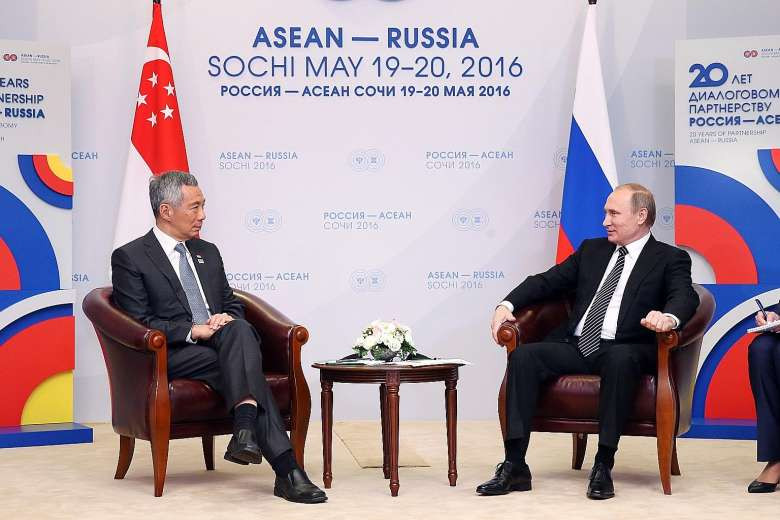 |
| Russian President Putin and Singaporean Prime Minister Lee Hsien Loong at the 2016 Russia-ASEAN Summit in Sochi, Russia. Source: StraitTimes |
There are many barriers
Russia's recent efforts to turn to Asia have also been demonstrated through a series of visits by President Putin, signing economic and political cooperation agreements, especially with China, India and even Japan. On the issue of North Korea, Russia has always been quite secretive, but a meeting between Russian President Putin and North Korean leader Kim Jong-un, which is being planned this month, has shown a real shift in Russia's interest in the region.
Experts say this is simply a “good for all” policy of Russian President Putin, aimed at influencing and strengthening the role and position in regions around the world, including the Asia-Pacific region. It was thought that this “peace is precious” strategy would be easy to implement, but the reality is not as favorable as the Moscow government had calculated.
A typical example is the relationship with Japan. In recent times, the two leaders have had a series of meetings but have not been able to resolve the biggest obstacle in the relationship between the two countries, which is the Kuril Islands dispute - the northern territory that Russia is controlling. Not only that, Russia's shift will certainly also encounter reactions from the US, which is also focusing its attention on this region. The discomfort has increased exponentially as Washington has recently been "inferior" to Moscow in the Syrian battlefield in the Middle East.
Or the North Korea issue, any expression of Russia's position on this dossier will be closely watched by both the US and China.
Besides, business habits and geographical barriers are also barriers that prevent cooperation between Russian enterprises and Asian countries from booming. And that, European markets are still important traditional partners that cannot be easily replaced.
Therefore, according to analysts, although it is possible to diversify relations with the Asian region, Russia probably will not trade its existing relations with Western countries. Instead, a strategy that skillfully balances relations between the parties, without being too biased towards either side, will be the scenario that Russia chooses at this time./.



